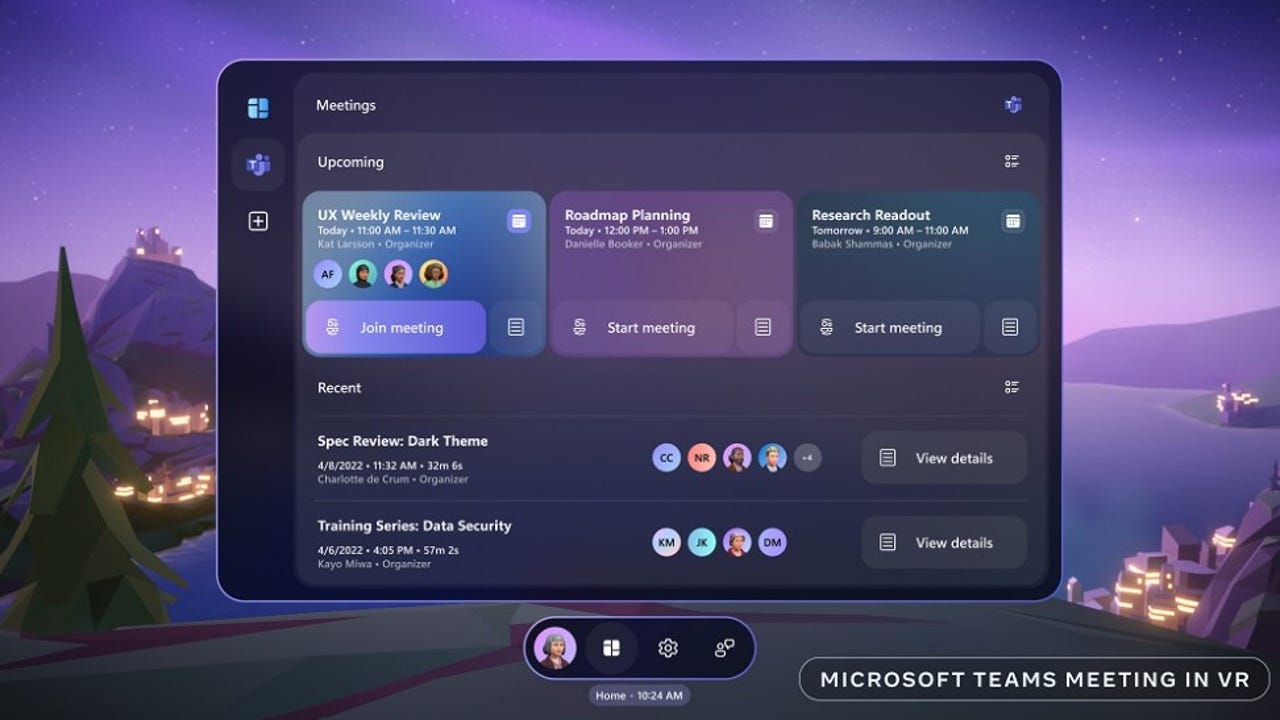































 Credit: Microsoft
Credit: Microsoft Meta debuted its Meta Quest VR devices on October 12. While Meta officials stressed that the Quest Pro is aimed at "prosumers," these devices also are likely to end up on the potential shopping list of business customers due to their price tag. So -- at least in some ways -- it makes sense that Microsoft was standing at the ready with plans to bring its own business software and services (plus some gaming integrations) to these VR devices at some point in the future.
As part of Meta's unveiling, Microsoft announced it will bring Mesh for Teams to Meta Quest devices. Microsoft's Mesh for Teams, announced in November 2021, is a feature of the Teams collaboration platform which will combine the mixed-reality capabilities of the Microsoft Mesh platform with the productivity tools like meetings, chat and document collaboration of Teams.
Microsoft has been building immersive spaces for Mesh for Teams users, as well as avatars that Teams users can use as an alternative to having their cameras always on. Its plan has been to enable Mesh for Teams to work on smartphones, laptops and mixed-reality headsets. Microsoft and Meta officials said today they are working to make Teams avatars and Meta avatars to be able to work together inside Teams, and that Teams meetings "soon" will work inside Meta's Horizon Workrooms environment.
Microsoft also announced today that its Microsoft 365 apps will be available on Meta Quest devices so that people can interact with Word, Excel, PowerPoint, Outlook and SharePoint within VR. Windows 365, Microsoft's cloud-PC service, also will be available on the Meta Quest devices so users can stream their Windows Cloud PCs using their own personalized apps, content and settings, to their VR devices.
Additionally, Microsoft announced plans for Intune PC management service and Azure Active Directory to support Meta Quest Pro and Meta Quest 2, so thatt IT admins can provision these devices for usings with a Quest for Business subscription from Meta. This means these VR devices will be able to be secured and managed the same way they are in workplaces currently.
Microsoft and Meta officials also said they are "exploring ways" to bring Xbox Cloud Gaming to the Meta Quest Store, which would allow gamers to stream Xbox games to the Meta Quest platform.
Microsoft's announcements around its Meta Quest work also mentions that the company is still committed to its own HoloLens mixed-reality platfom and that Microsoft is "excited to continue evolving our mixed-reality devices roadmap." The creator of HoloLens, Alex Kipman, left Microsoft earlier this year. And according to reports, Microsoft scrapped plans for a new HoloLens 3 device and is trying to figure out the way forward in both the enterprise and consumer mixed-reality spaces.
Microsoft CEO Satya Nadella has said publicly that Microsoft believes there will be multiple metaverses in a variety of areas, from gaming to commercial. The company has been honing its enterprise metaverse strategy for the past couple of years, via which it is attempting to position a variety of products and services, including the HoloLens, Mesh, IoT services and digital twins offerings, as key components of its enterprise metaverse stack.
 Tags quentes :
Tecnologia
Vestíveis
Tags quentes :
Tecnologia
Vestíveis